I was recently reading a rather vitriolic comment thread on a blog post related to carbon dioxide and global warming and came across references to the Dunning-Kruger effect, in which people who made what seemed to me like outlandish statements about climatology while admitting that they had no formal training in any related field were advised to look up the Dunning-Kruger effect and then come back to the conversation. One commentor did and when he came back he was highly offended that anyone would say the Dunning-Kruger effect would apply to him. Intrigued, I resolved to look into the Dunning-Kruger effect myself and see what the fuss was all about, and, I must say, I find it both intuitive and fascinating at the same time.
Essentially, the Dunning-Kruger effect is simply that the less competent a person is in a given field the less ability that person has to recognize just how incompetent they are so they actually end up with a vastly overinflated view of how competent they are. Or, as Dunning and Kruger wrote when they published their results in The Journal of Personality and Social Psychology:
People tend to hold overly favorable views of their abilities in many social and intellectual domains. The authors suggest that this overestimation occurs, in part, because people who are unskilled in these domains suffer a dual burden: Not only do these people reach erroneous conclusions and make unfortunate choices, but their incompetence robs them of the metacognitive ability to realize it. Across 4 studies, the authors found that participants scoring in the bottom quartile on tests of humor, grammar, and logic grossly overestimated their test performance and ability. Although their test scores put them in the 12th percentile, they estimated themselves to be in the 62nd. Several analyses linked this miscalibration to deficits in metacognitive skill, or the capacity to distinguish accuracy from error. Paradoxically, improving the skills of participants, and thus increasing their metacognitive competence, helped them recognize the limitations of their abilities.
Fascinating, no? But what, I can hear 10,000 Birds readers asking, does this have to do with birding? The answer, of course, is that the least competent birders, people who probably shouldn’t even be referred to as birders, have the most overinflated view of their own birding ability!
If you are someone who spends time in the field carrying binoculars anywhere near where Bald Eagles might be a possibility you have probably had a conversation like this.
Mr. Incompetent: Hey, did you see that eagle?
You: No. Where did you see an eagle?
Mr. Incompetent: Over there, sitting in that tree [points]
You: [putting binoculars up] Oh, that’s a Red-tailed Hawk.
Mr. Incompetent: No way, that bird is way too big to be a hawk. I know all about eagles and that’s an eagle.
You: [sighing] It has a red tail! And Bald Eagles are much larger and have white heads and tails!
Mr. Incompetent: Young eagles don’t! That’s probably why it is smaller. I even heard this eagle scream and everyone knows only eagles scream.
You: [Give up and walk away]
So, did that sound familiar? Note that the Mr. Incompetent was correct in that subadult Bald Eagles have neither a white head nor a white tail but that Mr. Incompetent was completely oblivious to the fact that Bald Eagles never, ever, scream but Red-tailed Hawks do! But the truth is that one single fact does not make a person competent, and that little tiny bit of knowledge, which might have been gleaned while flipping channels and momentarily pausing on a nature show, only made Mr. Incompetent more sure of the fact that he was actually Mr. Competent, a nice illustration of the Dunning-Kruger effect, if I do say so myself.
What I am going to share with you now might shock some of you, but, well, here we go: I have not always known as much about birds as I do now (not that I know anywhere near as much as people who have birding their whole lives but I know which end of the binoculars to look through anyway). And, not too many years ago, I can remember having the conversation below with a more experienced (and very patient) birder:
Me: Hey, what other raptors besides Bald Eagles scream?
More Experienced Birder: I don’t understand what you mean.
Me: Well, I was out birding the other day and this raptor went over but it was not big enough to be an eagle, but it screamed like they do. What do you think it was?
MEB: Corey, I hate to break it to you, but Bald Eagles don’t scream. [hand up to stop me from interrupting] I know, I know, it seems like every time you see an eagle on TV or in a movie it screams but that doesn’t change the fact that they simply do not scream. What you saw was the raptor that does scream, a Red-tailed Hawk.
Me: Well I feel like quite the dummy…
Now, I was stunned and amazed and felt both stupid and angry. How could I not know that eagles don’t scream? And how could there be this vast conspiracy in the entertainment industry just to make poor unwitting fools think that they do? But, I must admit, learning this bit of information in such a nice way made me realize that there was a whole heck of a lot more about birds that I didn’t know than what I did know. It also made me realize that though my folks were amazed at my ability to tell a Purple Finch from House Finch I still had a long way to go (and still do) before I could be considered anything close to an expert. So while my birding skills might only have increased a small amount that day, my metacognitive skills in relation to birding took a great leap forward.
The fact is that there are thousands, if not millions, of people out there that might take a passing interest in birds, who might own a field guide or put out seed, who might, on occasion, get a bird completely wrong but not want to admit how wildly off they were in their identification. Understand that it is not their fault that they have no idea how incompetent they are, but it is merely their lack of metacognition and make it your duty to teach them more so that the incompetent and overconfident can become the mildly competent and insecure, and eventually, maybe even competent, which is the best most of us can hope for!
So, the next time you encounter someone in the field who is a blowhard know-it-all but actually knows not very much at all, well, try to teach them. Remember that the more that they learn the more likely they will be to understand the limits of their own competence, the less likely they are to have an overinflated view of their own skills, and the less likely they will report a misidentified rarity to a birding listserv and have you waste your time and energy chasing it!
Finally, I am not in any way competent when it comes to psychology so, if I managed to misunderstand something here and have fallen victim to the Dunning-Kruger effect myself, well, please forgive me and feel free to correct me in the comments.
…
This post was originally published on 22 September 2009, but we hate to keep posts this good buried in the archives!
………


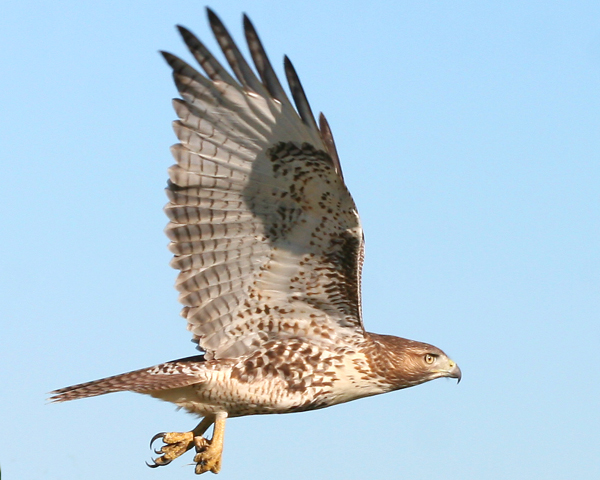





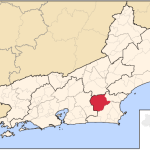
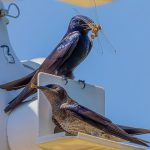
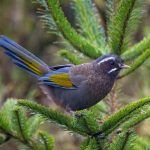
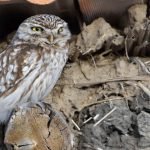
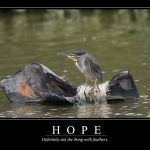
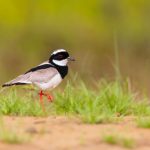

The part that intrigued me about the effect (or what I heard about in other people’s comments, at least) was that apparently while incompetent people over-estimated their competence, truly competent people tended to underestimate theirs. So the people least likely to speak up about a subject may tend to be exactly the people who should.
If it’s any consolation, the entertainment industry does not help dispel myths about birds in general and eagles screaming in particular. Movies and TV use two bird calls almost exclusively, I’ve found–a loon call and a red-tailed hawk scream. The calls are used to help set a “tone” and are sometimes heard where no self-respecting loon or redtail would ever be heard. The loon call is used, once I remember in a desert, to represent something forlorn or slightly scary, and the redtail scream is used to represent something lonely, such as when the hero is lost somewhere.
I am strictly an amateur birdwatcher. It is fun for me (read: not an obsession). I started this hobby late in life, after my own chickadees flew the nest. I recognize the phenomenon you describe, and have no doubt that it happens just that way. But let me also say, from my inexperienced point of view, that “real” birders can be just a tad intolerant of the rest of us.
Corey, lets be honest here. I have had that conversation with you many-a-time and we have switched roles on occasion.
Even good birders fall into that from time to time.
I fear I fall into this trap regularly.
Kind of like one of my wife’s favorite sayings. “The one who argues the
loudest or protests the most is usually wrong” (or in terms of Corey’s
post the most incompetent).
Yes, we must all strive to get beyond the point of knowing just enough to be dangerous. It often comes as a revelation, “Oh man, I didn’t know diddely three years ago.”
@ Carolyn H.
So true! The loon call in the completely wrong habitat is a classic — although I think my favorite Hollywood bird call remains the Canada goose sound track in “Dances with Wolves” as the sandhill cranes fly overhead.
I’ve probably been guilty of this from time to time.
In case it makes you North Americans feel better:
The scream of the Red-tailed Hawk, strictly an American species, is a prominent feature even in European movies, e.g. when a Golden Eagle is shown in a sentimental “Heimat” movie from the Alps or – most remarkable – when Europeans produce a Western (e.g. the Winnetou series) and a bunch of Old World Vultures (most often Griffons or African White-backed vultures!!) circle over the remains of dead indians / cowboys / farmers / cavalry soldiers etc.
Actually, there is one citation from Rumsfeld (and geez am I ever unlikely to cite HIM if I can help it! Just throw “Old Europe” at me and see me go off!!) that I thought was very remarkable and that realtes to the Dunning-Kruger effect (I am not sure I get the citation right word by word but the meaning should come across):
There are known knowns (things we know we know), known unknowns (things we know we don’t know) and unknown unknowns (things we don’t know we don’t know).
The more unknown unknowns there are, the more (overly) confident people tend to be and the more expertise people gain (learning about the existence of unknowns), the more aware people get of the number of (now known) unknowns which makes them far more cautious. Ideally a birder would eventually get from the known unknowns to the known knowns by researching the unknowns to turn them into knowns, but despite so much good recent literature, that’s still a long and winding road.
By the way, that was a hard comment to write for a non-native speaker.
And of course the moment you become aware of unknown unknowns, you realize that there is an unknown number of unknown unknowns.
I brought this page up during a meeting at work today to describe some of the people in our company.
Having worked the back side of the Great Backyard Bird Count for five years I think if anything we are underestimating the extent of this effect in birding 🙂
“vast conspiracy in the entertainment industry”
Same goes for other creatures: cats announce their presence at night by going “yaaow” once; and horses invariably make that stock “way-way-wuh” sound.
I had read about this a while ago. One of the most unfortunate things is that the best birders are likely to overestimate the birding skills of others! Also, the worst birders are incapable of seeing the skills of better birders as better than their own and thus won’t improve their skills by learning from much better birders. *sigh*
The example with the bald eagle and the red-tailed hawk made me laugh.
Red-tails occasionally perch in the trees at my parent’s apartment complex. One day while visiting I noticed a red-tailed hawk in the trees. When I went into the apartment my father asked if I had seen the bald eagle, and I replied oh that was a hawk not a an eagle. My father countered by saying that he knew it was an eagle because he had seen eagles on TV.
That being said, I cam fall into the trap where I sometimes overestimate my birding abilities too.
I love knowing about the Dunning-Kruger effect–can’t wait to mention it to some of my conservative relatives the next time they start lecturing me about my views. (Lovely folks in all other respects, but the non-facts they fall for, oh my! At least I use fact-checker websites, even on some liberal statements that I agree with.)
On the birding front, it makes me feel much better about being unsure of a lot of ids; at least I know I don’t know. I’ve sometimes (lots of times, actually) felt bad about it, thinking “I should know that bird, even at that distance, or brief look, or (esp. with sparrows and shorebirds and gulls), long look.” Thank you for sharing this again.
Speaking of Hollywood goofs – I’m nowhere near being a birder, but I DO know what hermit thrush sounds like and I enjoy getting outraged when I I hear them in a soundtrack in a densely populated suburban setting. I believe “Parenthood” has one such example. Or maybe it’s a wood thrush. That would be a known unknown.